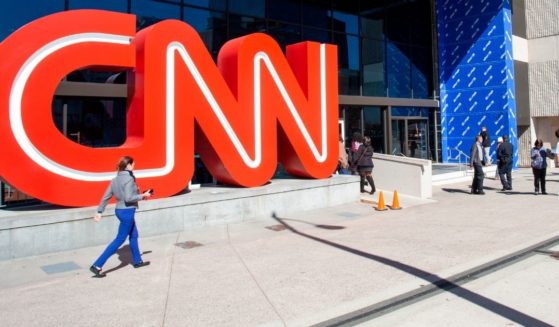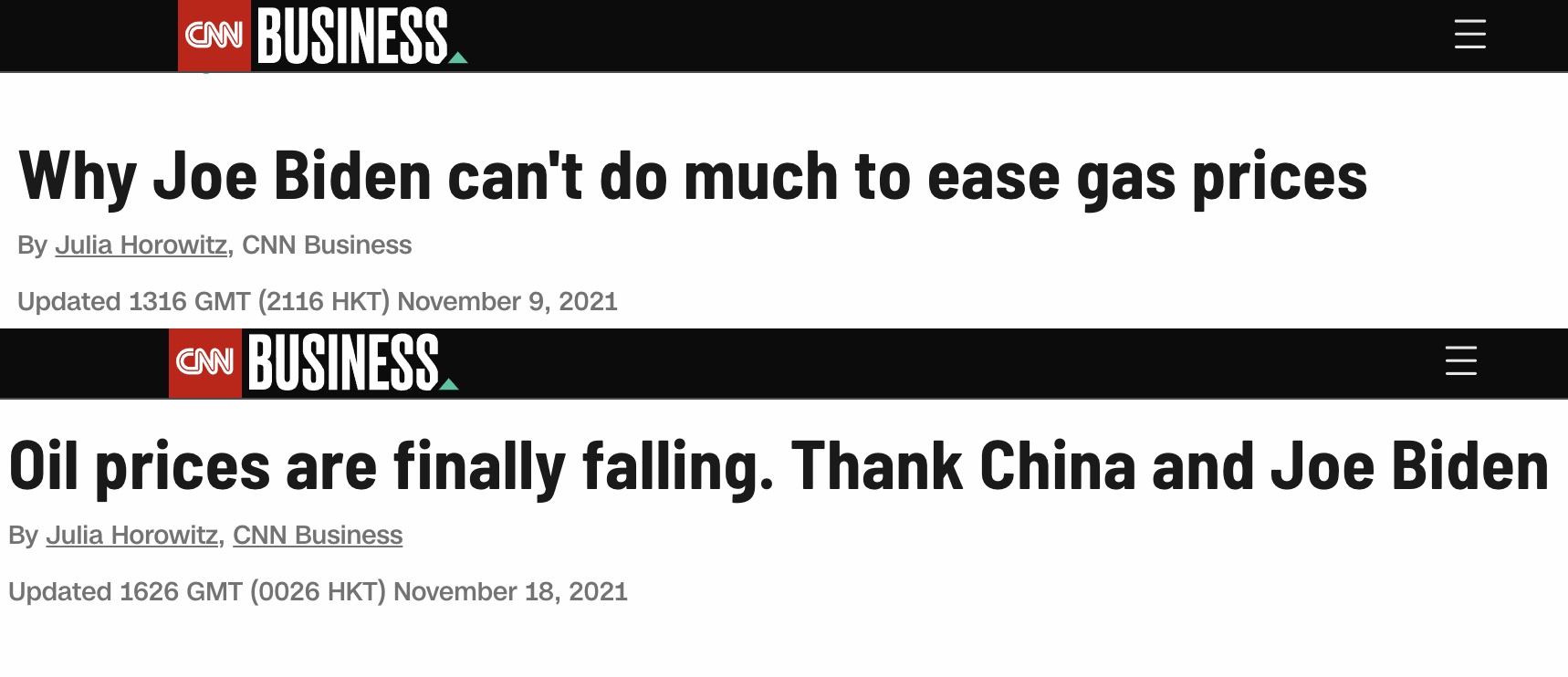
It reads almost like a Babylon Bee parody of CNN. Instead, it’s proof that reality catches up to satire with appalling haste these days.
On Nov. 9, CNN Business’ Julia Horowitz wrote to reassure readers about gas prices. Not that they were going down, but that Dear Leader had nothing to do with them being high.
Headline: “Why Joe Biden can’t do much to ease gas prices.” Noting that President Biden “faces growing pressure to intervene in oil markets as Americans pay higher prices at the pump” — including pressure from Democrat lawmakers, who called on the president to release oil from the Strategic Petroleum Reserve — Horowitz argued that, “given the dynamics at play,” the president didn’t have much leeway and that tapping into the SPR wouldn’t make much difference.
“The run-up in prices has been triggered by a surge in demand for fuel as the global economy recovers from its pandemic slump, as well as limited investment in boosting production outside of the Middle East. Those shifts may not be transitory,” she wrote.
“In the past, when energy prices rose dramatically, that was incentive enough to push American firms to start spending more to boost output. This time around, however, that funding is harder to come by. Investors are less likely to back long-term projects as they weigh the consequences of the climate crisis. They’re also pushing companies to keep costs low and focus on returning money to shareholders after the twin price shocks in 2015 and 2020.”
Never mind that Biden’s policies are to blame for American energy companies not wanting to boost output — and getting shot down when they try, as was the case with Keystone XL. She also noted that both OPEC and Russia were unwilling to boost output. Her reporting, such as it was, relied in large part on quotes from UBS analyst Giovanni Staunovo.
Staunovo said the SPR was “the wrong tool to address the current elevated prices … The strategic oil reserves usually help during a temporary disruption.” As for gas above $3 a gallon: “It’s probably the new normal that prices will stay higher.”
Nine days later, same writer, different take entirely:
Amazing! It turns out he can do something — when oil prices are falling, that is.
While it can take a while for oil price drops to show up at the pump in the form of lower gas prices, it’s worth noting gas prices were down slightly, too. As Horowitz noted in her article, “some of the pressure has started to lift” on what’s been almost a uniformly upward trajectory since the new administration came into office.
Why? One reason is that Biden, um, will likely release oil from the SPR.
In her article, Horowitz said, “Bjornar Tonhaugen, head of oil markets at the consultancy Rystad Energy, told me that the biggest factor driving prices right now is the expected release of strategic reserves from the United States and China.”
“According to the White House, US President Joe Biden and Chinese President Xi Jinping discussed the ‘importance of taking measures to address global energy supplies’ during their virtual summit this week. That sparked chatter about a coordinated move initiated by the White House to put millions of barrels of oil on the market,” she reported.
“A spokesperson for China’s National Food and Strategic Reserves Administration told CNN on Friday that it was ‘pushing forward with crude oil release-related work at the moment,’ but declined to comment on whether it was in response to a US request to work together to tackle the supply crunch.”
And while that might not get prices down for long, “more lasting relief could be coming. The [International Energy Agency] said in a report this week that it expects global oil supplies to rise by 1.5 million barrels per day over November and December as some production in the United States picks up again.”
For whatever reason, Mr. Staunovo of UBS — the one quoted by Horowitz nine days earlier saying it was “probably the new normal that prices will stay higher” — wasn’t quoted by CNN this time. Maybe he was on vacation.
It’s worth noting the headlines to Julia Horowitz’s stories don’t just describe mutually exclusive scenarios regarding gas and oil prices; they manage to pull off the neat trick of both being wrong.
On the first count, we know there’s plenty Biden can do to ease gas prices, both in the short and long term; Horowitz describes how an expected release of oil from the SPR would drive prices down until more production could come online, something the president can help facilitate if he quietly eats some crow on his hard-line take on fossil fuels and encourages oil production in the United States.
Quelle surprise — he’s not doing that. Instead, according to The Wall Street Journal, the president sent a letter to the Federal Trade Commission on Wednesday alleging illegal price-fixing by gas companies, claiming there was “mounting evidence of anti-consumer behavior by oil-and-gas companies” because gas prices had gone up, despite the fact the price of unfinished gasoline, which hasn’t been blended yet, has been down.
However, the second headline manages to be wrong inasmuch as it’s not China or Joe Biden causing oil prices to go down, but rather the market’s pricing in anticipated moves by China and Joe Biden.
This isn’t a distinction without a difference; the administration has no fixed energy policy, but instead fecklessly vacillates between moves designed to appease the Democratic Party’s progressive flank and American voters. The latter group considers high gas prices to be a bug in the system; the former demands that it be a feature.
Which one determines whether the administration releases oil from the SPR? Depends on where the pressure is most acutely felt. The market is betting it’s from disaffected voters who just handed the Democrats a series of ugly losses in off-year elections.
But then, none of this matters to CNN. Gas prices high? Don’t blame the president. Gas prices low? Thank him. That’s as complicated as it gets.
When that mindset produces unintentionally hilarious opposing headlines like the ones we saw atop Julia Horowitz’s stories, just nine days apart, you gain a bit more appreciation for how hard it is to write for The Babylon Bee in 2021.
